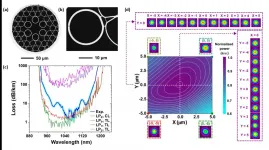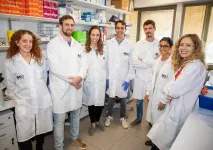Ten lessons from the virus crisis
How some rich countries failed, and why -- study
2021-02-22
(Press-News.org) A mixture of smaller countries led by New Zealand, Vietnam, Taiwan, Thailand, Cyprus, Rwanda and Iceland led the world 's Top 10 countries to manage their COVID-19 response well, according to a new study.
In the study, published in The BMJ, lead researcher Flinders University's Professor Fran Baum joined experts from around the world to reflect upon the Global Health Security Index (October 2019) predictions for a public health emergency.
Along with Australia, Latvia and Sri Lanka among the best responders, the list highlights some of the 10 key causes of why some countries were successful or not in containing COVID-19 pandemic over the past year.
The US, UK, Netherlands, Australia, Canada, Thailand, Sweden, Denmark, South Korea, Finland (France, Slovenia and Switzerland) were ranked as 'most prepared' on the index.
And while high-income countries report an average score of 51.9 (out of 100), the index shows that collectively, international preparedness for epidemics and pandemics remains very weak, the study noted.
"Now we know that ten factors contributed to the index failing to predict country responses, including overlooking the power of political, economic, and social contexts and the role of civil society - notably in western developed countries like the US and UK," says Professor Baum, from the Southgate Institute for Health, Society and Equity at Flinders University.
"Our study builds a strong case for these 10 factors to be used in future assessments of pandemic preparedness to take into account a systems approach which enables a focus on critical system components," the 15 authors say in the new article published in a special British Medical Journal analysis series 'COVID-19: The Road to Equity and Solidarity'
The 10 variables identified in the new study are:
1. Limited consideration of globalisation, geography, and global governance. For example, island nations such as Australia, New Zealand and other Pacific countries could prepare manage better than regional organisations such as the EU.
2. Bias to high income countries. The pandemic exposed dontrasts between biosecurity measures in high-income countries and their actual ability to rally community participation in prevention and control measures.
3. Failure to assess health system capacity.
4. Role of political leadership. Under pandemic conditions, do leaders understand and garner trust in evidence-based infectious disease management? For example, New Zealand Prime Minister Jacinta Ardern's leadership was clear and emphatic - resulting in a far better outcome than foreseen in the index.
5. Context of countries' political, social, cultural and financial systems. For example, the US, Belgium, Australia and South Africa are federated responses but separately had quite different responses and outcomes to the pandemic.
6. Limits of national health systems did not always correlated as a predictive factor. For example, lower income countries such as Rwanda and Vietnam had better results perhaps due to better allocation of limited resources for maximum national effect.
7. The pandemic highlighted pre-existing health and social inequities in some high-income countries, such as the UK and US, where minority ethnic groups experienced a higher burden of the COVID-19 disease.
8. The index didn't foresee the effects of differences in social security provisions for an extended epidemic.
9. The civil capacity for a response was not assessed. For example, South Africa's Cape Town community action networks are working to both ameliorate the consequences of lockdown and reduce local transmission..
10. Gaps between capacity and its application. For example, political intervention in the US blocked the Centres for Disease Control and Prevention rolling out advanced epidemiology training programs in a more timely and uniform fashion
"The crucial lesson from the COVID-19 pandemic is that an effective response does not rely just on a strong public health system but also requires a society that is fair and offers all its citizens and residents social and economic security," the study concludes.
INFORMATION:
'Explaining COVID-19 performance: what factors might predict national responses?' (2021) by Fran Baum, Toby Freeman, Connie Musolino, Mimi Abramovitz, Wim De Ceukelaire, Joanne Flavel, Sharon Friel, Camila Giugliani, Philippa Howden-Chapman, Nguyen Thanh Huong, Leslie London, Martin McKee, Jennie Popay, Hani Serag, Eugenio Villar' (2021) by and F Baum has been published in BMJ 2021; 372 doi: 10.1136/bmj.n91
The Southgate Institute is part of the Punching Above Weight research network which considers why some countries achieve higher health status than their economic performance would suggest. In 2020, the Southgate Institute was designated as a World Health Organization Collaborating Centre to support international research and knowledge translation on social, political, and commercial determinants of health equity.
[Attachments] See images for this press release:

ELSE PRESS RELEASES FROM THIS DATE:
2021-02-22
People with periodontitis are at higher risk of experiencing major cardiovascular events, according to new research from Forsyth Institute and Harvard University scientists and colleagues.
In a longitudinal study published recently in the Journal of Periodontology, Dr. Thomas
Van Dyke, Senior Member of Staff at Forsyth, Dr. Ahmed Tawakol of Massachusetts General Hospital, and their collaborators showed that inflammation associated with active gum disease was predictive of arterial inflammation, which can cause heart attacks, strokes, and other dangerous manifestations of cardiovascular disease.
For ...
2021-02-22
Despite deaths and hospitalisations linked to many new psychoactive substances (NPS), an international wastewater study led by the University of South Australia shows just how prevalent 'party pills' and 'bath salts' are in different parts of the world.
In a new paper published in Water Research, the world's most comprehensive wastewater analysis of NPS shows the pattern of designer drug use in the 2019/2020 New Year in 14 sites across Australia, New Zealand, China, The Netherlands, Spain, Italy, Norway and the United States.
UniSA analytical chemist Dr Richard Bade says samples were collected over the New Year in each country and ...
2021-02-22
CORVALLIS, Ore. - Oregon State University and U.S. Department of Agriculture researchers have significantly expanded the understanding of the hop genome, a development with important implications for the brewing industry and scientists who study the potential medical benefits of hops.
"This research has the unique ability to impact several different fields," said David Hendrix, an associate professor in the Department of Biochemistry and Biophysics and the School of Electrical Engineering and Computer Science at Oregon State. "If you're talking to beer drinkers, they will be excited about the brewing side. If you are talking to the medical field, they are going to be excited about the pharmaceutical potential."
The findings are outlined in ...
2021-02-22
CORVALLIS, Ore. - Scientists at Oregon State University and the U.S. Forest Service have demonstrated that DNA extracted from water samples from rivers across Oregon and Northern California can be used to estimate genetic diversity of Pacific salmon and trout.
The findings, just published in the journal Molecular Ecology, have important implications for conservation and management of these species, which are threatened by human activities, including those exacerbating climate change.
"There has been a dearth of this kind of data across the Northwest," said Kevin Weitemier, a postdoctoral fellow at Oregon State and lead author of the paper. "This allows us to get a quick snapshot of multiple populations and species all at once."
In addition to demonstrating ...
2021-02-22
CORVALLIS, Ore. - Desert bighorn sheep in the Mojave National Preserve in California and surrounding areas appear to be more resilient than previously thought to a respiratory disease that killed dozens of them and sickened many more in 2013, a new study has found.
Clint Epps, a wildlife biologist at Oregon State University, and several co-authors, found that exposure to one of the bacteria associated with the disease is more widespread among bighorn sheep populations in the Mojave, and that its presence dates further back, than scientists thought. But they also found that the overall number of infected bighorn has declined since 2013 in the populations surveyed.
Epps and his colleagues, including Nicholas Shirkey, an environmental scientist with ...
2021-02-22
Recent spotlights on IC-HCPCFs are due to the recently demonstrated outstanding ultralow-loss performances and their application capabilities. Nevertheless, while their attenuation achieves impressive figures, the challenge of accomplishing a low loss, single-mode (SM), and polarization-maintaining HCPCF perseveres.
In a new paper published in Light: Science & Applications, a team of scientists, led by Professor Fetah Benabid from the University of Limoges, France, and in collaboration of the University of Modena, Italy and the company GLOphotonics, proposed and ...
2021-02-22
CORVALLIS, Ore. - Dogs synchronize their behavior with the children in their family, but not as much as they do with adults, a new study from Oregon State University researchers found.
The findings are important because there is a growing body of evidence that dogs can help children in many ways, including with social development, increasing physical activity, managing anxiety or as a source of attachment in the face of changing family structures, the researchers said. Yet, very little research has focused on how dogs perceive and socially engage with children.
"The great news is that ...
2021-02-22
In the course of a new and groundbreaking study, led by Dr, Natalia Freund and the doctoral candidate Avia Waston at the Sackler Medical Faculty, the research group succeeded in isolating monoclonal antibodies, which hindered the growth of tuberculosis germs in laboratory mice. The antibodies were isolated from a patient who had succumbed to active tuberculosis disease but had since recovered. This is, in fact, the first time in history that researchers have managed to develop a "biological antibiotic" and demonstrate that human monoclonal antibodies can act as a substitute for the traditional chemical antibiotics and protect mice from pathogenic bacterial challenge. The study was carried out in a collaboration with two additional laboratories from the US ...
2021-02-22
At the heart of most electronics today are rechargeable lithium-ion batteries (LIBs). But their energy storage capacities are not enough for large-scale energy storage systems (ESSs). Lithium-sulfur batteries (LSBs) could be useful in such a scenario due to their higher theoretical energy storage capacity. They could even replace LIBs in other applications like drones, given their light weight and lower cost.
But the same mechanism that is giving them all this power is keeping them becoming a widespread practical reality. Unlike LIBs, the reaction pathway in LSBs leads to an accumulation of solid lithium sulfide (Li2S6) and liquid lithium polysulfide (LiPS), causing a loss of active material from the sulfur cathode (positively charged electrode) and corrosion of the lithium ...
2021-02-22
In civil engineering, flexural beams are used to control the effect of vibrations that can cause cracks to appear in surfaces (concrete slabs) and beams. This is particularly important in buildings that require high tensile strength and where the use of machinery can cause a lot of vibrations that can disturb structural integrity. One metric to determine the reliability of beams is the deflection value, which should be appropriately low relative to the structure the beams are used in. Engineering codes such as ACI codes include provisions for such values and there are a number of methods to calculate them. Deflection is altered practically by reinforcing the construction materials with concrete or steel.
In this review, engineers ...
LAST 30 PRESS RELEASES:
[Press-News.org] Ten lessons from the virus crisis
How some rich countries failed, and why -- study









